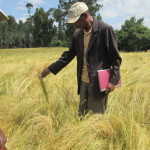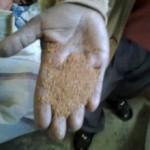IFPRI Discussion Paper 2224. Much has been written about energy poverty, but there is relatively limited evidence of what determines the gender gap in energy poverty and how it can be overcome in rural areas. This study used Focus Group Discussions, in-depth interviews with farmers and Key Informant Interviews to analyze gendered information, access, adoption […]
Men can cook: Effectiveness of a light-touch men’s engagement intervention to change attitudes and behaviors in rural Ethiopia
Discussion Paper 02212. Graduation model interventions seek to address multiple barriers constraining households’ exit from poverty, however, few explicitly target unequal gender norms. Using a randomized control trial design, combined with three rounds of data, we investigate the impacts on gender equitable attitudes and behaviors of a graduation program that seeks to simultaneously “push” households […]
Key stakeholders and actions to address Lake Beseka’s challenges in Ethiopia: A social network approach
IFPRI Discussion Paper 02135 Lake Beseka is a shallow, saline, endorheic lake in the East African Rift Valley of Ethiopia that has dramatically grown in size due to large-scale irrigation development in its catchment area. Recent artificial connections of the lake with the Awash River system to contain lake size have led to a series […]
Gender gaps in sustainable land management and implications for agricultural productivity: Evidence from Ethiopia
IFPRI Discussion Paper 02136 We investigate whether a large-scale watershed program promoting sustainable land management (SLM) in Ethiopia increases adoption of SLM and its benefits on plots owned by women in male-headed households compared to plots owned by their spouses, jointly owned plots as well as plots of female headed households (FHH). The analysis is […]
IFPRI Discussion Paper: Near-real-time welfare and livelihood impacts of an active civil war: Evidence from Ethiopia
IFPRI Discussion Paper 2108: Ethiopia is currently embroiled in a large-scale civil war that has continued for more than a year. Using unique High-Frequency Phone Survey (HFPS) data, which spans several months before and after the outbreak of the war, this paper provides fresh evidence on the ex durante impacts of the conflict on the […]




